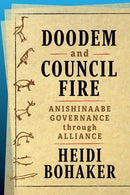Description
Settler scholar, Heidi Bohaker, combines socio-legal and ethnohistorical studies to present a book on the history of doodem, or clan identification markings, left by Anishinaabe on treaties and other legal documents from the seventeenth through the nineteenth centuries. These doodems reflected fundamental principles behind Anishinaabe governance that were often ignored by Europeans, who referred to Indigenous polities in terms of tribe, nation, band, or village – classifications that failed to fully encompass longstanding cultural traditions of political authority within Anishinaabe society.
Making creative use of natural history, treaty pictographs, and the Ojibwe language as an analytical tool, Doodem and Council Fire delivers groundbreaking insights into Anishinaabe law. The author asks not only what these doodem markings indicate, but what they may also reveal through their exclusions. The book also outlines the continuities, changes, and innovations in Anishinaabe governance through the concept of council fires and the alliances between them. Original and path-breaking, Doodem and Council Fire offers a fresh approach to Indigenous history, presenting a new interpretation grounded in a deep understanding of the nuances and distinctiveness of Anishinaabe culture and Indigenous traditions. This book contains 37 b&w illustrations.
Doodem and Council Fire : Anishinaabe Governance through Alliance, includes an extensive list of acknowledgements in the Preface and Acknowledgements.
Excerpt from the Preface:
" I accumulated many more scholarly and personal debts in writing this book that are described in the Acknowledgments, including to Elders and Knowledge Holders from eastern Great Lakes communities who took the time to share their knowledge with me and through many wonderful conversations and collaborations with other GRASAC col-leagues and with students over the past fifteen years."
Excerpt from the Acknowledgements:
"I would first like to say a resounding chi-miigwetch to the Anishi-naabe communities whose history this is and to express my profound gratitude for the tremendous kindness and patience you have shown this outsider/settler. You have so kindly welcomed me over the years, shared research and teachings, and taught me much, although I still have so much to learn. I would like to say a special thank you to the Mississaugas of the Credit First Nation, Mississauga First Nation, Wiik-wemkoong Unceded Territory, M’Chigeeng First Nation, Chippewas of Rama First Nation, Chippewas of Nawash Unceded First Nation, Curve Lake First Nation, and Sagamok Anishnawbek First Nation. I also have been very fortunate to be invited regularly to speak at the Mississaugas of the Credit First Nation’s annual multi-day historical gathering, now in its tenth year, which has grown to attract hundreds of attendees."
Making creative use of natural history, treaty pictographs, and the Ojibwe language as an analytical tool, Doodem and Council Fire delivers groundbreaking insights into Anishinaabe law. The author asks not only what these doodem markings indicate, but what they may also reveal through their exclusions. The book also outlines the continuities, changes, and innovations in Anishinaabe governance through the concept of council fires and the alliances between them. Original and path-breaking, Doodem and Council Fire offers a fresh approach to Indigenous history, presenting a new interpretation grounded in a deep understanding of the nuances and distinctiveness of Anishinaabe culture and Indigenous traditions. This book contains 37 b&w illustrations.
Doodem and Council Fire : Anishinaabe Governance through Alliance, includes an extensive list of acknowledgements in the Preface and Acknowledgements.
Excerpt from the Preface:
" I accumulated many more scholarly and personal debts in writing this book that are described in the Acknowledgments, including to Elders and Knowledge Holders from eastern Great Lakes communities who took the time to share their knowledge with me and through many wonderful conversations and collaborations with other GRASAC col-leagues and with students over the past fifteen years."
Excerpt from the Acknowledgements:
"I would first like to say a resounding chi-miigwetch to the Anishi-naabe communities whose history this is and to express my profound gratitude for the tremendous kindness and patience you have shown this outsider/settler. You have so kindly welcomed me over the years, shared research and teachings, and taught me much, although I still have so much to learn. I would like to say a special thank you to the Mississaugas of the Credit First Nation, Mississauga First Nation, Wiik-wemkoong Unceded Territory, M’Chigeeng First Nation, Chippewas of Rama First Nation, Chippewas of Nawash Unceded First Nation, Curve Lake First Nation, and Sagamok Anishnawbek First Nation. I also have been very fortunate to be invited regularly to speak at the Mississaugas of the Credit First Nation’s annual multi-day historical gathering, now in its tenth year, which has grown to attract hundreds of attendees."


